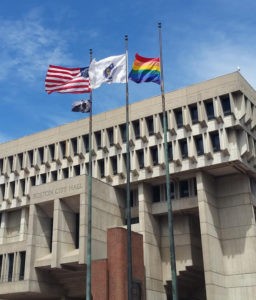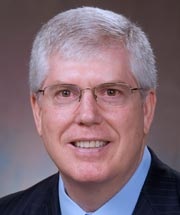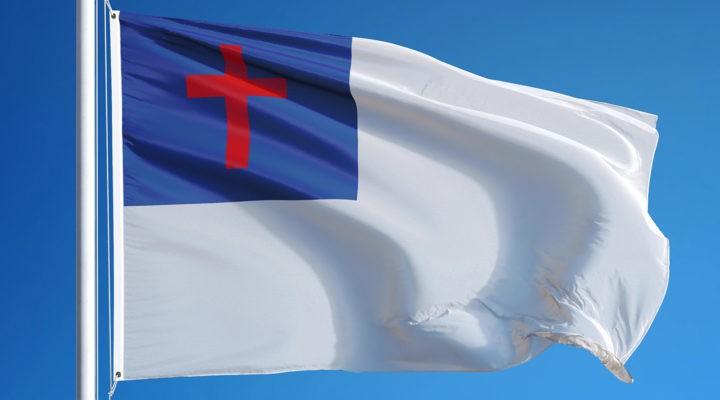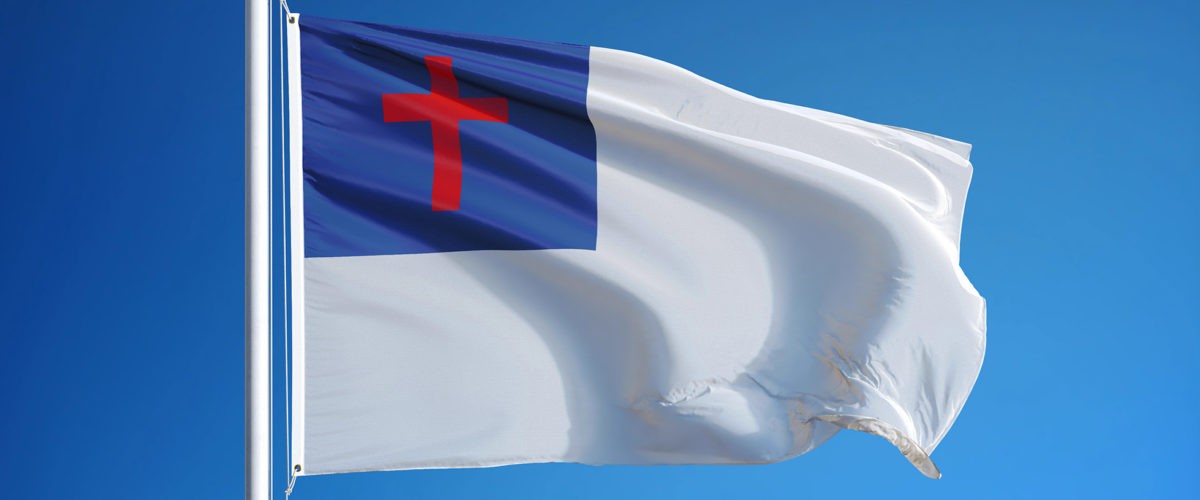The U.S. Supreme Court has agreed to hear a case this term that pits the two religious liberty clauses of the First Amendment against each other — on a flagpole.
At issue is a request by a Christian civic group, Camp Constitution, for the City of Boston to allow a Christian flag to fly on one of two City Hall flagpoles commonly used by civic groups and movements. The city offers groups the opportunity to fly their flags briefly on the two poles to encourage civic engagement.

Flags at Boston City Hall (City of Boston image)
To date, the city has allowed at least 284 private organizations to raise their flags and never had turned down a request until Camp Constitution asked to fly what is commonly known as the “Christian flag” — a white background with a blue square at the upper-left corner containing a red cross. The group wanted to fly the flag for about an hour on Constitution Day 2017, to commemorate Constitution Day “and the civic and cultural contributions of the Christian community to the city of Boston, the Commonwealth of Massachusetts, religious tolerance, the rule of law and the U.S. Constitution.”
Flags previously flown on the poles include the flags of various countries, a Juneteenth flag, the LGBTQ rainbow pride flag and the transgender rights flag.
Camp Constitution’s request was denied because the group wanted to fly the flag of a single religion, which city leaders feared would place them in violation of the First Amendment’s Establishment Clause, which says government may not give preferential treatment to one religion over other religions.
On the other hand, Camp Constitution claims the city denied its First Amendment rights to free exercise of religion — the other half of the First Amendment’s religious liberty statement.
There is no evidence the city had been asked previously to fly the flag of any other single religion, although Camp Constitution’s attorneys point out that they had flown the Turkish flag, “which depicts the Islamic star and crescent,” and the Portuguese flag, “which uses religious imagery.”
In January, the First U.S. Circuit Court of Appeals sided with the city, which argued that the flagpole is not a public forum, the city’s raising of a third-party flag is government speech, and the city can choose the views it wants to express. The appeals court supported the original ruling of a federal judge who first heard the case.
Camp Constitution appealed that January ruling to the Supreme Court, which chose the case from among hundreds of other cases denied hearing.
Americans United for Separation of Church and State was among the first religious liberty watchdog groups to urge the Supreme Court to reject Camp Constitution’s claim, noting the case, Shurtleff v. Boston, “could significantly endanger religious freedom and church-state separation.”

Rachel Laser
Americans United President Rachel Laser said: “The separation of church and state is the constitutional principle that guarantees everyone’s right to religious freedom and to be treated equally under the law. To protect this core American principle and to respect the religious diversity that defines our country, the Supreme Court should not force the City of Boston to fly a Christian flag at city hall.”
Forcing the city government to fly a Christian flag on its property “would not only undermine the foundational principle of church-state separation, it would play right into the hands of Christian nationalists who want the government to force everyone to live by their beliefs — threatening everyone’s religious freedom and widening inequality in our communities and country,” she added.
Camp Constitution is being represented by Liberty Counsel, an evangelical Christian ministry active in pursing religious liberty cases, especially those focused on free exercise claims.

Mat Staver
“We look forward to the U.S. Supreme Court hearing Boston’s unconstitutional discrimination against Camp Constitution’s Christian viewpoint,” said Liberty Counsel Founder and Chairman Mat Staver. “The city cannot deny the Christian flag because it is ‘Christian’ and allow every other flag to fly on its flagpoles. There is a crucial difference between government endorsement of religion and private speech, which government is bound to respect. Censoring religious viewpoints in a public forum where secular viewpoints are permitted is unconstitutional and this case will set national precedent.”
Related articles:
‘Religious liberty’ is being hijacked: expressing our faith responsibly within the civic realm | Opinion by Molly Marshall
BJC offers timely answers to questions about religious liberty


